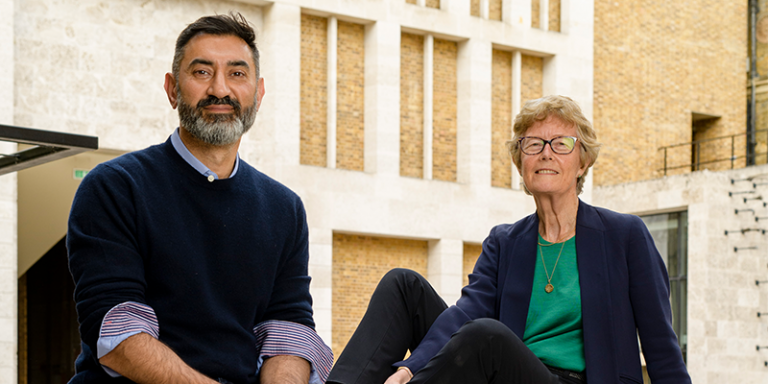Tackling inequality through research, education and policy
9 June 2022
Professor Wendy Carlin and Professor Imran Rasul on tackling inequality

This interview originally appeared in the UCL Policy Lab magazine.
Professor Wendy Carlin and Professor Imran Rasul are the co-directors of the Stone Centre at UCL. In particular, the centre advances research and teaching to provide a clear understanding of the causes of wealth inequality, and its economic and political consequences. Here, they reflect on the need to challenge inequalities and the role that the UCL Policy Lab might be able to play in their work.
Professor Wendy Carlin is clear about the advantages of drawing together the resources of the Stone Centre at UCL with the UCL Policy Lab. “It is the combination of firepower on the three fronts of research, education and policy that could make a difference,” she says.
Carlin and her co-director, Professor Imran Rasul, believe that research has powerfully demonstrated the long-term advantages that accrue to those who have wealth, and the powerful disadvantages that confront those who do not.
“Having wealth means being able to take risks and to innovate, like starting a business, or in even relatively modest ways, like moving to a different place or learning new skills,” Carlin explains. “The ‘many’ are excluded from the ‘risk and innovation’ club.”
“In many ways working on this agenda is very personal to me,” Rasul adds. “My parents came to the UK as migrants in the 1960s, and a combination of hard work and economic opportunities allowed their family to experience tremendous mobility over two generations.” Those opportunities now seem under threat for many. “Understanding how our society can allow everyone to fulfil their potential and enjoy economic security, and making sure that knowledge spreads, is something that is very important to me — as a father and as an economist,” Rasul says.
Enhancing understanding and generating action, therefore, are the two tasks now confronting all of us.
“The Stone Centre works with Curriculum Open-access Resources in Economics (CORE) Economics Education, which is transforming the teaching of economics around the world,” Carlin continues. “What is distinctive about CORE is that it begins the study of economics from big problems in the world and steps back from that to show how economic models and data can provide insight.”
In the long term, this may well lead to profound policy change. “By bringing students into economics this way,” Carlin argues, we can hope to “influence future policymakers, media and policy professionals, and citizens. We hope it will recruit more economists to build and spread the knowledge base.”
But vital though this research and education is, Carlin and Rasul note that it is also crucial to build a broader coalition for change in the here and now.
In the UK, public figures from the food writer, Jack Monroe, to the footballer, Marcus Rashford, have recently done a huge amount to highlight the challenges confronting those who begin life without access to wealth. And these efforts are vital. “They motivate new research by revealing how inequality is experienced and they show us new ways of getting the message out,” Carlin argues. As it seeks to build the case for policy action, “it will be interesting to see how the UCL Policy Lab goes about making connections like these.”
As it does so, Carlin concludes, we can have reason to hope, despite all of the profound economic challenges that research has revealed. “I am constantly buoyed up by seeing how people can be mobilised to do good,” she shares. “From everyday gestures of kindness toward strangers, to large-scale acts of solidarity as we witnessed in the pandemic and in support for Ukraine, this willingness to make a sacrifice for other people is the aspect of humanity that gives us a chance of saving the planet.” Rasul agrees. “As a discipline,” he says of economics, “I believe we have so much to contribute to the public good, and it makes me hopeful that so many young people want to get involved, understand and use that to make a positive change.”
Wendy Carlin is a Professor of Economics and co-director of the Stone Centre on Wealth Concentration, Inequality and the Economy.
Imran Rasul is a Professor of Economics and co-director of the Stone Centre on Wealth Concentration, Inequality and the Economy.
 Close
Close

